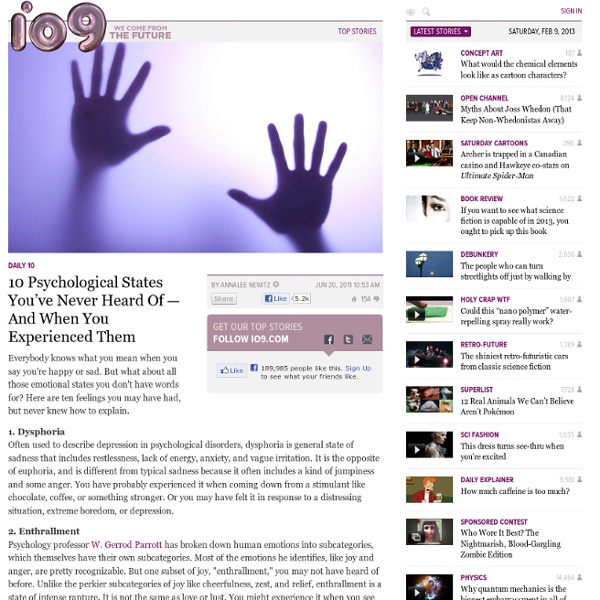



http://io9.com/5813475/10-psychological-states-youve-never-heard-of--and-when-you-experienced-them
25 Acts of Body Language to Avoid Our body language exhibits far more information about how we feel than it is possible to articulate verbally. All of the physical gestures we make are subconsciously interpreted by others. This can work for or against us depending on the kind of body language we use. Some gestures project a very positive message, while others do nothing but set a negative tone.
The Essential Psychopathology Of Creativity Andrea Kuszewski If we could identify a gene for creativity, let's call it the "creativity gene", you would be hard pressed to find very many people who would consider it a "negative gene" or a hazard to possess or carry. But what if, purely hypothetically, we could identify a gene for Schizophrenia? Or Bipolar Disorder? Or Depressive Disorder? Or ADHD? Social Phobia Social phobia, also called Social Anxiety Disorder, is an anxiety disorder characterized by overwhelming anxiety and excessive self-consciousness in everyday social situations. People with social phobia have a persistent, intense, and chronic fear of being watched and judged by others and of being embarrassed or humiliated by their own actions. Their fear may be so severe that it interferes with work, school, or other activities. While many people with social phobia recognize that their fear of being around people may be excessive or unreasonable, they are unable to overcome it. They often worry for days or weeks in advance of a dreaded situation.
Watch Psychology Documentaries Online Free - Part 5 Marc Dutroux (born 6 November 1956 in Brussels) is one of the sickest human beings ever born. He is a Belgian criminal, convicted of having, in 1995 and 1996, kidnapped, tortured and sexually abused six girls, ranging in age from 8 to 19, four of whom died as a result. He was also convicted of having killed a suspected former accomplice, Bernard Weinstein. He was arrested in 1996 and has been in prison since then. The Truth About Homework September 6, 2006 The Truth About Homework Needless Assignments Persist Because of Widespread Misconceptions About Learning 8-Circuit Model of Consciousness The eight-circuit model of consciousness is a theory proposed by Timothy Leary and expanded on by Robert Anton Wilson and Antero Alli. The model describes eight circuits of information (eight "brains") that operate within the human nervous system. Each circuit is concerned with a different sphere of activity. Leary, Alli and Wilson have written about the model in depth and how each circuit operates, both in the lives of individual people and in societies. The term "circuits" came from the first wave of cybernetics research and development in the United States in the 1970s. (Others[weasel words] have proposed that the term "systems" should be substituted for "circuits" to reflect both a systems theory approach and also the changing anatomy of an entity as it goes through a neurological change).
Best and Worst Learning Strategies: Why Highlighting is a Waste of Time In a world as fast-changing and full of information as our own, every one of us — from schoolchildren to college students to working adults — needs to know how to learn well. Yet evidence suggests that most of us don’t use the learning techniques that science has proved most effective. Worse, research finds that learning strategies we do commonly employ, like rereading and highlighting, are among the least effective. (MORE: How to Use Technology to Make You Smarter)
Triangular theory of love The triangular theory of love is a theory of love developed by psychologist Robert Sternberg. In the context of interpersonal relationships, "the three components of love, according to the triangular theory, are an intimacy component, a passion component, and a decision/commitment component. List of unsolved problems in philosophy This is a list of some of the major unsolved problems in philosophy. Clearly, unsolved philosophical problems exist in the lay sense (e.g. "What is the meaning of life?", "Where did we come from?"
7 Lessons From 7 Great Minds Have you ever wished you could go back in time and have a conversation with one of the greatest minds in history? Well, you can’t sorry, they’re dead. Unless of course you’re clairaudient, be my guest. But for the rest of us, we can still refer to the words they left behind. Even though these great teachers have passed on, their words still live, and in them their wisdom.